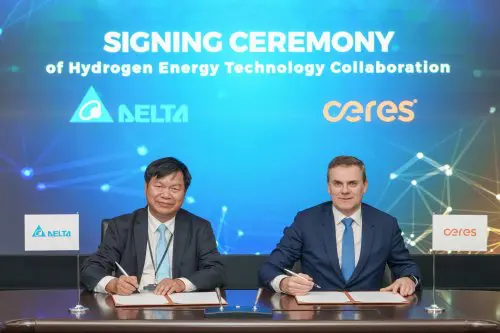Major $55m deal for solid oxide hydrogen power
|
January 18, 2024
Nick Flaherty
Delta Electronics is to build a factory to make solid oxide electrolysis cell (SOEC) and solid oxide fuel cell (SOFC) stacks using technology from Ceres Power in the UK in a $55m deal.
The global long-term manufacturing collaboration and licence agreement for hydrogen power technology will see revenue of £43m ($55m) to Ceres through technology transfer, development license fees, and engineering services from Delta. Half of this is expected to be recognised as revenue in 2024, and there is potential for additional revenue from the sale of Ceres development stacks to Delta.
The factory construction will start from 2024 and the initial production by Delta is expected to start by the end of 2026. Delta expects to carry out product development and production line integration at its Tainan plant with Ceres’ engineering service support.
The deal also includes royalty payments to Ceres on future commercial production and sale to end customers by Delta.
China fuel cell joint ventures for Bosch, Ceres
Ceres delays Chinese fuel cell joint venture
Delta’s expertise in mass manufacturing, power electronics and data centres for customers such as Microsoft has seen it diversify into turnkey power systems and the development of smart buildings, energy infrastructure, grid balancing and energy storage for customers such as Tesla. The deal to develop equipment using solid oxide hydrogen will be a key driver for the technology.
“Hydrogen will play a crucial role in the global transition towards net-zero. Moreover, Hydrogen SOFC systems boast reliability and high efficiency in electricity generation, making them ideal for micro-grid applications, distributed power systems, mission-critical facilities, such as data centres, semiconductor production lines, and other advanced manufacturing,” said Ping Cheng, Delta’s CEO.
“By leveraging Ceres’ expertise in solid oxide stack technology and our industry-leading technologies in power and thermal management, Delta will enrich its infrastructure solutions portfolio by delivering high-efficiency SOFC and SOEC systems for our customers worldwide, hence, further contributing to global carbon reduction targets.”
In addition to licensing key energy stack technologies, Delta will also establish a “Net-zero Science Laboratory” at its Tainan manufacturing complex to develop cutting-edge zero-carbon technologies, including hydrogen energy, and to enrich its own R&D capabilities in related application fields.
“We believe Delta can deliver efficient clean hydrogen solutions for its customers utilising both our SOFC and SOEC technologies. Green hydrogen has a key role to play in delivering a more secure and sustainable future energy system and today we take this first step towards what promises to be a strong collaboration with Delta to accelerate the industry globally,” said Phil Caldwell, CEO of Ceres.
Delta expects to further integrate its diverse smart energy solutions, including microgrid applications and energy management platforms, with these hydrogen energy systems to provide a more comprehensive and flexible low-carbon infrastructure offerings to its customers.
Bosch moves into the power station business using UK tech
Bosch boosts stake in UK hydrogen solid oxide fuel cell developer
Ceres has a joint venture deal with Bosch and Weichei for data centre power systems.
The Ceres’ stack technology has a power generation efficiency, which is around 60% and can even reach 85% with a heat recovery system, significantly higher than the efficiency of centralized gas-fired power generation units. SOFC can be built near places with electricity demands and so is able to avoid power transmission loss and other unexpected unstable factors during the transmission and distribution process.
SOEC technology produces hydrogen up to 25% more efficiently than incumbent low temperature technologies particularly when thermally integrated with industrial processes.
www.deltawww.com; www.ceres.tech
If you enjoyed this article, you will like the following ones: don’t miss them by subscribing to :
eeNews on Google News
Share:
Post Disclaimer
The information provided in our posts or blogs are for educational and informative purposes only. We do not guarantee the accuracy, completeness or suitability of the information. We do not provide financial or investment advice. Readers should always seek professional advice before making any financial or investment decisions based on the information provided in our content. We will not be held responsible for any losses, damages or consequences that may arise from relying on the information provided in our content.



